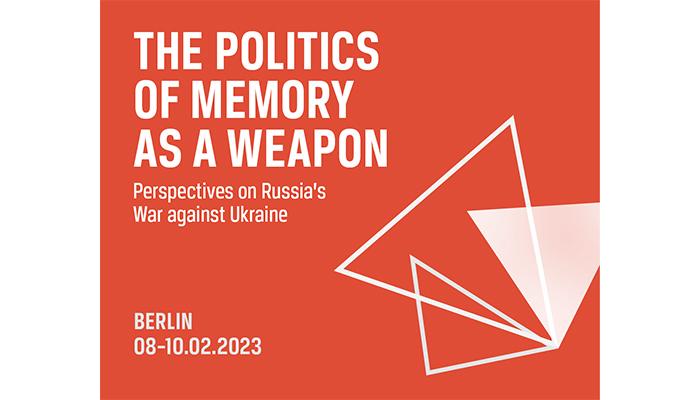International Conference "The Politics of Memory as a Weapon. Perspectives on Russia’s War against Ukraine", 8-10 February 2023

International Conference "The Politics of Memory as a Weapon. Perspectives on Russia’s War against Ukraine" 8-10 February 2023
The instrumentalization of history and culture in order to achieve political aims has a long history. For many years now, Vladimir Putin and the Russian authorities have been advancing falsified historical narratives and highly fictional historical and cultural arguments as geopolitical weapons. While Russia’s war against Ukraine continues, it is crucial to discuss the methods of counteracting this disinformation. These issues will be the subject of the international conference 'The Politics of Memory as a Weapon: Perspectives on Russia’s War against Ukraine' organised by European Network Remembrance and Solidarity and Federal Institute for Culture and History of the Germans in Eastern Europe in cooperation with the Documentation Centre for Displacement, Expulsion, Reconcilation.
The conference 'The Politics of Memory as a Weapon: Perspectives on Russia’s War against Ukraine' aims to examine the mechanisms and methods used in the political and social implementation of historical disinformation, the portrayal of the enemy, and discuss ways in which these can be prevented or mitigated. This will entail a (self-)critical analysis of political and scholarly dealings with history in various European countries. We shall also reflect on what happens when warnings from political and academic voices are not taken seriously enough, and on the consequences of the way in which attention has shifted from Russia to Ukraine.
The crucial questions to be discussed during the conference include: When is it appropriate not only to speak out in contradiction, but to engage in political or even judicial countermeasures when dealing with widely divergent interpretations or indeed the falsification of historical facts? Where do propaganda and social manipulation begin? What can or should we expect from ‘public intellectuals’ in times of war and crisis? How can we ensure that civil society is enlightened and immunised, while at the same time guaranteeing the free exchange of ideas and historical interpretations? How effective can literature and art be in this endeavour? Is it possible for the concepts used in public history to be properly understood, and what part can dissidents play here? What digital tools can be deployed to deflect propaganda and trolls on social media?
The panels during the conference will cover a wide range of topics, among others: ‘What should we have known about Russia and Ukraine? The limits of European intellectual and political discourse’ (with Guido Hausmann, Martin Šimečka, Marek Cichocki and Chantal Delsol); ‘Political approaches to Central and Eastern Europe’ (with Andrej Kolesnikov, Anna Kwiatkowska and Hans-Christian Petersen), Russia's War in Ukraine – Between Imperialism and (Self-)Destruction?’ (with Irina Scherbakova, Marieluise Beck, Andrzej Nowak and Antoine Arjakowsky).
Free Admission
Conference language
English and partly German
Registration
Participation in the conference is free but registration is obligatory:
https://cutt.ly/politicsofmemory2023register
Conference Venue
Stiftung Flucht, Vertreibung, Versöhnung - Stresemannstraße 90, 10963 Berlin
The conference will be livestreamed on the YouTube channel of the Documentation Centre Flucht, Vertreibung, Versöhnung.
Organisers
- European Network Remembrance and Solidarity, Warsaw
-
Federal Institute for Culture and History of the Germans in Eastern Europe, Oldenburg
in collaboration with - Documentation Centre for Displacement, Expulsion, Reconciliation, Berlin